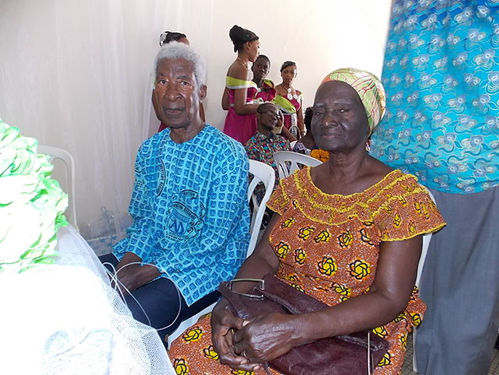11.6: Sexuality in Late Adulthood
- Page ID
- 167938
According to Kane (2008), older adults are often viewed as genderless and asexual. There is a stereotype that elderly individuals no longer engage in sexual activity and when they do, they are perceived to have committed some kind of offense. These ageist myths can become internalized, and older people have a more difficult time accepting their sexuality (Gosney, 2011). In reality, many older couples find greater satisfaction in their sex life than they did when they were younger. They have fewer distractions, more time and privacy, no worries about getting pregnant, and greater intimacy with a lifelong partner (NIA, 2013). Results from the National Social Life Health, and Aging Project indicated that 72% of men and 45.5% of women aged 52 to 72 reported being sexually active (Karraker, DeLamater, & Schwarz, 2011). Additionally, the National Survey of Sexual Health data indicated that 20%-30% of individuals remain sexually active well into their 80s (Schick et al., 2010). However, there are issues that occur in older adults that can adversely affect their enjoyment of healthy sexual relationships.

Causes of Sexual Problems
According to the National Institute on Aging (2013), chronic illnesses such as arthritis, diabetes and heart disease can lead to sexual challenges such as join pain, erectile dysfunction or anorgasmia. Hormonal changes, physical disabilities, surgeries, and medicines can also affect a senior’s ability to participate in and enjoy sex. How one feels about sex can also affect performance. For example, someone who is unhappy about their appearance as they age may think their partner will no longer find them attractive. A cultural focus on youthful physical beauty especially for women may get in the way of them enjoying physical intimacy. Many people with penises have a problem with erectile dysfunction (ED) once in a while, and some may fear that ED will become a more common problem as they age. If there is a decline in sexual activity for a heterosexual couple, it is typically due to a decline in the male’s physical health (Erber & Szuchman, 2015).
Overall, the best way to experience a healthy sex life in later life is to keep sexually active while aging and to not fall victim to negative cultural stereotypes about aging. However, the lack of an available partner can affect heterosexual women’s participation in a sexual relationship. Beginning at age 40 there are more women than men in the population, and the ratio becomes 2 to 1 at age 85 (Karraker et al., 2011). Because older men tend to pair with younger women when they become widowed or divorced, this also decreases the pool of available men for older women (Erber & Szuchman, 2015). In fact, a change in marital status does not result in a decline in the sexual behavior of men aged 57 to 85 years-old, but it does result in a decline for similar aged women (Karraker et al., 2011).
Dating in Later Adulthood: Due to changing social norms and shifting cohort demographics, it has become more common for single older adults to be involved in dating and romantic relationships (Alterovitz & Mendelsohn, 2011). An analysis of widows and widowers ages 65 and older found that 18 months after the death of a spouse, 37% of men and 15% of women were interested in dating (Carr, 2004a). Unfortunately, opportunities to develop close relationships often diminish in later life as social networks decrease because of retirement, relocation, and the death of friends and loved ones (de Vries, 1996). Consequently, older adults, much like those younger, are increasing their social networks using technologies, including e-mail, chat rooms, and online dating sites (Fox, 2004; Wright & Query, 2004; Papernow, 2018).
Interestingly, older men and women parallel online dating information as those younger. Alterovitz and Mendelsohn (2011) analyzed 600 internet personal ads from different age groups, and across the life span, men sought physical attractiveness and offered status related information more than women. With advanced age, men desired women increasingly younger than themselves, whereas women desired older men until ages 75 and over, when they sought men younger than themselves. Research has previously shown that older women in romantic relationships are not interested in becoming a caregiver or becoming widowed for a second time (Carr, 2004a). Additionally, older men are more eager to re-partner than are older women (Davidson, 2001; Erber & Szuchman, 2015). Concerns expressed by older women included not wanting to lose their autonomy, care for a potentially ill partner, or merge their finances with someone (Watson & Stelle, 2011).
These are responses to questions asked to an 84 year old widow regarding her sexuality:
1. What do you think people should know about the sexuality of senior adults?
It's still there! You never stop wanting the closeness of another person. The hormones are not surging as they did in your youth but they are still there. It's a myth and/or old wives tales that sexuality goes away after menopause, that you dry up and that's it. Not true! There is snow on the roof but there is a fire in the furnace!
2. Can a woman in older years have an orgasm? How important is your sexuality to you right now?
Older women can definitely have an orgasm, even multiple! My sexuality is very important to me. It makes me feel alive and youthful even though I am in my "twilight" years. It's a YES, I can still do it!
3. What was your stage in life when you felt most fulfilled sexually and why? What was special about that stage?
When I was in my twenties I felt most sexually fulfilled. I was 24 when I met my husband and there was immediately a sexual attraction on both sides. It was amazing, exciting and fulfilling. The passion lasted throughout most of our marriage, it just became more tender and loving.
4. If you are able to relive the stages of your sexuality through the lifespan and development, what would you like to change?
This is a tough one! I don't think I would change anything except possibly not having a relationship, lover etc. after my husband died as I was a young 60. With that being said, the thought of another man touching me was something I could not handle or wanted. I had more than one "relationship" when I was single before I married, but a sexual relationship after Marty scared the hell out of me! I just didn't want it. Not quite sure why.


